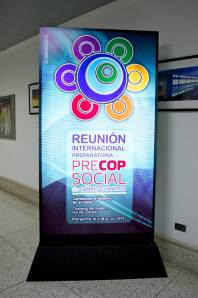by Sacajawea (Saki) Hall, Cooperation Jackson and the Malcolm X Grassroots Movement
While attending the People’s Summit on Climate Change in Lima, Peru as a member of the Grassroots Global Justice Alliance delegation, my mind was focused on the relationship between the intensifying struggles at home with the deepening struggles throughout the world. I couldn’t help but think about how the intense protests against police violence and for greater living wages and worker protections, amongst others, could strengthen the struggle for system change being demanded throughout the global south to halt climate change and its escalating dangers. Lima affirmed that my work through Cooperation Jackson to create alternatives to the extractive economy in the heart of the United States by building economic democracy rooted in cooperative economics and social solidarity as a model, can be and is a significant contribution to the global struggle for a just transition.
In an article, “Notes for Understanding the Lima Outcome” Pablo Solon provides an analysis of the document coming out of the United Nation’s climate talks. Lima marked the 20th year of the Framework Convention on Climate Change, or Conference of Parties (COP) and the draft document coming out of the negotiations will be finalized in Paris this year as the governing international treaty on climate change. Solon states, “In synthesis, an “agreement” that does not close the emissions gap for this decade, that continues with voluntary contributions with no clear targets for the next decade, has no strong compliance mechanisms and more cheating carbon market mechanisms, puts the future of humanity and life as we know it on our planet Earth in serious jeopardy.” [Emphasis mine.] I arrived in Lima knowing a lot was at stake, and left clear that we are in a state of emergency. We have to step up our game and engage in more radical thought and action to address the gravity of our current situation.
Systemic Violence from the State and Capitalist System
I consider myself knowledgeable about the various forms that state violence manifests. I relate the struggle against poverty, for reproductive justice, racial justice, as fights against state violence, but this trip translated terms I hear all the time like environmental racism and genocide specifically into environmental and ecological violence. While this seems obvious, and I laughed at myself realizing surely its been said and quickly did a google search, it was my first time thinking of it that way and I couldn’t remember hearing the term. Violence is not only a physical and immediate brutal act of aggression, but a deliberate act that threatens life and shows no regard for it. Displacement, natural disasters, the human response to natural disasters, exposure to chemical toxins, loss of biodiversity, access to clean water and other impacts perpetrated by governments and corporations have to constantly be framed as environmental and ecological violence to define the severity and the urgency of our response.
Putting climate change and its effects in the context of violence not only broadens the definition, but broadens the need for radical action and see it as self-defense.
Climate Justice and Human Rights
A major highlight of the gathering in Lima was the Global People’s March in Defense of Mother Earth on December 10th, International Human Rights Day. Although this mass mobilization took place on Human Rights Day, it was not apart of the messaging of the march. This made me realize that the human rights language and framework I’ve grown accustomed to at other gatherings that are parallel or outside alternatives to the United Nations was not present in Lima. Climate Justice as human rights were talked about in some spaces, but it was not central to the gathering as if it could not be used in the face of such blatant human rights violations and posturing. The irony was glaring as the United Nations process continued to be hijacked by corporations and watered down by states like the U.S with false solutions that contradict human rights principles and standards and even worse, further the human rights violations echoed by everyone at the People’s Summit and march. In fact there are no references to human rights in the final draft document, only in the preamble, which is not legally binding.
Although the tension between embracing human rights and rejecting the United Nations made sense, it didn’t sit right with me. Heavily recognizing the conditions imposed on our communities as human rights violations and asserting our rights as human rights seemed critical to me. Reading a reflection on Human Rights Day by Ajamu Baraka, a long-term US based human rights organizer, helped to contextualize the utter abuse and disregard for human rights in the COP 20. This quote from Baraka is instructive, “As a result of the cynical use of human rights by Western states, particularly the last two administrations in the U.S., there is deep dissatisfaction with the human rights idea. This is occurring right at the historical moment when the idea of human rights could provide an alternative ethical and policy guide for countering the global economic, political and social crises that governments and tens of millions of people are experiencing. Without a radical “de-colonization” of its basic tenets, methodologies and institutions, the orthodox human rights framework is unable to offer anything more than bland reforms and a “de-politicized” politics.”
As I reflected on the minimal presence of a human rights framework at the People’s Summit as dissatisfaction and even a rejection of it, I realized the value I placed on it is based on different type of human rights framework. My human rights training is rooted in the idea of a people’s centered human rights framework. I see the power and necessity in a people’s centered human rights framework that is able to do what Baraka speaks of “provide an alternative ethical and policy guide for countering the global economic, political and social crises…” At the same time I negotiate the contradictions with the existing legal and institutional frame based on understanding the values and limits of it.
A people’s centered human rights framework grows out of what oppressed people define for ourselves based on our struggles and goes beyond the limits of international legal text, it confronts white supremacy, settler-colonial capitalism, patriarchy and other systems of oppression that deny us our human agency and dignity. This framework is grounded in the understanding that we can only realize our full human rights when we change social relationships, structures and institutions.
In order to reclaim the mantle and strategic importance of the human rights framework, we have to get at the sources of the problem. One of the critical sources currently limiting the human rights framework is the doctrine and politics of “American Exceptionalism”. This doctrine maintains that the United States is simultaneously “a beacon on a hill” and the worlds rightful police force. And as a result, it can and must dictate the world’s agenda, and the rules and regulations that it imposes to implement this agenda, while it itself is immune to these rules and regulations. We have to challenge this exceptionalism and the image that prevails of the U.S. exemplifying human rights and therefore the rightful international defender of it. We have to put forth our people-centered human rights framework, link it with the emerging Rights of Mother Earth Framework and the concept of “buen vivir” (roughly translated as “living well together”) and reclaim our agency, social space, and the right to live in harmony with each other and our provider and sustainer, Mother Earth.
Critical Questions
For me, critical questions going into Lima and coming out are, how do we challenge and confront the discourse as well as the policies, practices and implications? How do we make our solutions real with concrete, successful, examples? What do we need to do between now and COP 21 in Paris and beyond? What shifts will we need to make to confront the aftermath and consequences of the international protocols set to come out of Paris?
Answers to this question in theory and practice are developing all over the world, including here in the U.S. Cooperation Jackson is putting forth our ideas that we hope can be a model for other parts of the country. For us, answers to these questions are deepening through our alliances and networks like the Grassroots Global Justice Alliance, Climate Justice Alliance and the Our Power Campaign. As a pilot site of the Our Power Campaign we are deepening our praxis to support our development of concrete solutions for a just transition.
Reflecting on Lima and events at the end of 2014, I think we need to strengthen our work around shifting the narrative, step up our collective action here in the U.S. and strategically come up with sustained coordinated global action to bring about the systems change we call for. At the same time, deepen our relationships and exchanges here in the U.S. and with international allies to continue developing alternatives to the extractive economy and examples of our solutions. We need to leverage international gatherings this year, like Paris and the World Social Forum in Tunisia to plan targeted coordinated actions and exchanges.
I see placing our struggles in the context of systemic violence and human rights as challenging the discourse that validates the false solutions presented as so called “climate action” coming out of the UN COP process. Being clear about what we are up against, the violent nature of oppression and who perpetrates it is critical to putting forth our own narrative. Not only climate change is life threatening, but the “climate action” in the form of REDD, Climate Smart Agriculture, Carbon Markets and the like are acts of violence against Mother Earth and our communities. We must intensify our resistance by finding every way to confront and disrupt the destructive, extractive economy. This includes incorporating the lessons from the mass non-compliant movements of the 20th century that we see potentially re-emerging through the current fight against police violence and campaigns for better wages and employee protections.
The human rights framework not only directly confronts systems of oppression and the actors that perpetrate it, but also offers an alternative policy. A crucial component of Cooperation Jackson’s work to build economic democracy and sustainable communities includes our effort to make Jackson, Mississippi a human rights city with a human rights commission and charter developed through a people’s centered process. In creating a human rights city, a system can be set up to protect the advances we make in economic democracy and structuring sustainable communities. If we are truly talking about changing the system and a just transition, it has to include developing an alternative set of principles, values, morals and policies. The people’s centered human rights framework demands that all rights are universal, interdependent, indivisible, and inalienable. It demands a system that ensures the rights of people and the rights of nature are equally respected, policies that protect these rights, and a system that is obligated to fulfill these rights by creating the conditions and providing the resources necessary.
I’m looking forward to the road to Paris, but even more so to the road beyond. I’m exciting about the possibilities. We have our work cut out for us in such challenging times, but it is our duty to win!
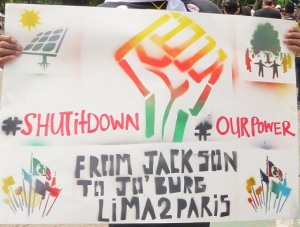 Summits are traditionally the social movements and civil society alternative to the United Nations Framework Convention on Climate Change, more commonly known as the Congress of Parties or COP. This People’s Summit, however focused little on COP 20 (for the 20th year of the UN Framework Negotiation process), and instead focused its attention on building links between social movements, confronting state repression, and promoting alternatives. It also focused on expanding the movement and promoting a just transition from the extractive economy on a global scale to wholeheartedly reject the final climate change framework that is expected at the COP 21 in Paris, France in 2015. To expand the movement and make the rejection as clear as possible, the majority of the civil society
Summits are traditionally the social movements and civil society alternative to the United Nations Framework Convention on Climate Change, more commonly known as the Congress of Parties or COP. This People’s Summit, however focused little on COP 20 (for the 20th year of the UN Framework Negotiation process), and instead focused its attention on building links between social movements, confronting state repression, and promoting alternatives. It also focused on expanding the movement and promoting a just transition from the extractive economy on a global scale to wholeheartedly reject the final climate change framework that is expected at the COP 21 in Paris, France in 2015. To expand the movement and make the rejection as clear as possible, the majority of the civil society adaptation, self-sustainability and self-management of the lands of Perú. Biodiversity was a main topic during these dialogues, at a time when the Northern Western agriculture focuses on the production of mono-crop for our diets and promises the land to privately owned US companies, Western culture dismissed the current exploited land of Sudamerica from it’s own crops and import it to our markets. The trend of quinoa in our diet has been a proof of this argument, such grain has been taken away from it’s own land and sold in a large profitable-margin; a similarity in the trails of NAFTA, where maize, a native crop of Mexico, is taken and re-sold to it’s own producer; quinoa is at the same pedestal of it’s own economy.
adaptation, self-sustainability and self-management of the lands of Perú. Biodiversity was a main topic during these dialogues, at a time when the Northern Western agriculture focuses on the production of mono-crop for our diets and promises the land to privately owned US companies, Western culture dismissed the current exploited land of Sudamerica from it’s own crops and import it to our markets. The trend of quinoa in our diet has been a proof of this argument, such grain has been taken away from it’s own land and sold in a large profitable-margin; a similarity in the trails of NAFTA, where maize, a native crop of Mexico, is taken and re-sold to it’s own producer; quinoa is at the same pedestal of it’s own economy.

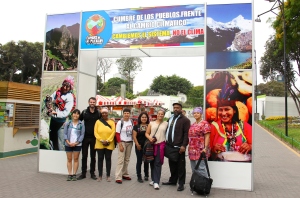
 purchasing credits that are then often used to fund the false solutions such as large unsustainable agrofuels.
purchasing credits that are then often used to fund the false solutions such as large unsustainable agrofuels.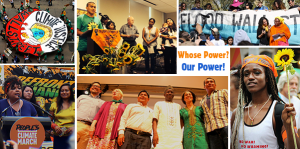 You probably heard this many times last week, but it’s worth saying again—the People’s Climate March on Sunday September 21, 2014 was a major historic event. It was historic because of the sheer numbers who came out to march (it’s being called the largest climate march in history, with estimates around 400,000 people in the streets of New York City). It was historic because the
You probably heard this many times last week, but it’s worth saying again—the People’s Climate March on Sunday September 21, 2014 was a major historic event. It was historic because of the sheer numbers who came out to march (it’s being called the largest climate march in history, with estimates around 400,000 people in the streets of New York City). It was historic because the 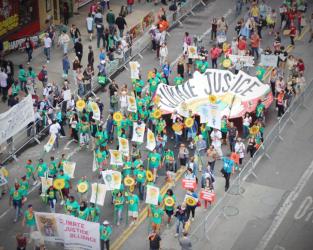 It takes roots to weather the storm, and these roots stretched across most of Manhattan on Sunday for the People’s Climate March (#PeoplesClimate). They then filled Wall Street with creative action and connected globally though discussions in auditoriums on Monday with the People’s Climate Justice Summit, and today will be holding a People’s Tribunal at the Church Center of the United Nations.
It takes roots to weather the storm, and these roots stretched across most of Manhattan on Sunday for the People’s Climate March (#PeoplesClimate). They then filled Wall Street with creative action and connected globally though discussions in auditoriums on Monday with the People’s Climate Justice Summit, and today will be holding a People’s Tribunal at the Church Center of the United Nations.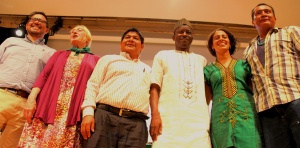 The Summit kicked off with powerful and clear testimonies of how the UN’s climate “action” is in contrast to what the people want and are building through the #OurPower Campaign. We say yes to climate justice, to indigenous rights, to food sovereignty, to public transportation, to zero waste systems, and to a just transition to the next economy. We see through the UN’s false promises and say no to biofuels, no to big dams, no to GMOs, no to climate-smart agriculture, no to the XL pipeline, and no to REDD (Reducing Emissions from Deforestation and forest Degradation) and carbon trading in all its forms.
The Summit kicked off with powerful and clear testimonies of how the UN’s climate “action” is in contrast to what the people want and are building through the #OurPower Campaign. We say yes to climate justice, to indigenous rights, to food sovereignty, to public transportation, to zero waste systems, and to a just transition to the next economy. We see through the UN’s false promises and say no to biofuels, no to big dams, no to GMOs, no to climate-smart agriculture, no to the XL pipeline, and no to REDD (Reducing Emissions from Deforestation and forest Degradation) and carbon trading in all its forms.

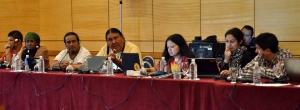 As a delegate of GGJ to the International Preparatory Meeting for the Social PreCOP on Climate Change, held on the Isle of Margarita, Venezuela, I was always mindful of the question of how to engage, from a grassroots position, coming from a rural Native community. Additionally, as an Executive Director of the Indigenous Environmental Network (IEN), I have a mandate on climate justice in our work with Native/Indigenous communities directly experiencing the effects of a changing climate, extreme weather events, and with some communities; fighting existing and expansion of fossil fuel development.
As a delegate of GGJ to the International Preparatory Meeting for the Social PreCOP on Climate Change, held on the Isle of Margarita, Venezuela, I was always mindful of the question of how to engage, from a grassroots position, coming from a rural Native community. Additionally, as an Executive Director of the Indigenous Environmental Network (IEN), I have a mandate on climate justice in our work with Native/Indigenous communities directly experiencing the effects of a changing climate, extreme weather events, and with some communities; fighting existing and expansion of fossil fuel development.